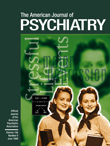Dr. Lewis and Colleagues Respond
To the Editor: The point of Kenneth A. Nakdimen, M.D., is well taken. Patients with dissociative identity disorder do have a storehouse of memories that are available to them only under certain circumstances and conditions. The patients’ usual lack of conscious access to these materials, however, presents clinically as amnesia.
We agree with Donald F. Klein, M.D. In this study, as in most clinical studies, the public availability of the full archival dossiers on each subject might make a useful scientific contribution. However, the task of presenting the thousands of pages of sensitive data for open publication would be exorbitantly costly, time consuming, and hence, unrealistic. Suffice it to say that in at least nine of the 12 cases presented, hospital records, neglect petitions, police records of parental brutality, or all three stood as objective evidence of serious maltreatment antedating the crimes committed.



